Blog • Published on:October 8, 2025 | Updated on:October 9, 2025 • 26 Min
Easiest Passport to Get: Top 10 Fast Citizenship Programs in 2025
Thinking about broadening your global mobility, safeguarding personal security, and providing a stronger future for your family? Acquiring a second passport through an established investment route is a topic on the minds of many worldwide.
Over the last decade, various countries have refined and promoted Citizenship by Investment (CBI) schemes to attract individuals who wish to establish stronger international ties.
This article outlines the top 10 fastest citizenship programs through investment.
Read on to learn why these 10 nations rank as premier destinations for securing a second passport and discover whether one could be your way to a more flexible global lifestyle.
Top Ten Fastest Citizenship Programs by Country
Ways to Obtain Dual Citizenship
There are multiple pathways to dual nationality, and not all require direct financial investments. Nearly half of the world’s countries allow dual citizenship in some form. Here are the main methods:
- Marriage to a Citizen
- Lineage or Descent
- Naturalization through Long-Term Residence
- Exceptional Services in Sports, Culture, or Science
- Investment-Based Citizenship Programs
Each route comes with specific prerequisites, and the level of complexity can vary dramatically from one jurisdiction to another.
Marriage to a Local Citizen
Several nations provide pathways to citizenship through marriage. The requirements and timelines differ depending on local laws. In Italy, a spouse should cohabit in Italy for at least two years before filing a citizenship application. In Spain, only after one year of marriage. The spouse of a U.S. citizen generally secures a Green Card first and may apply for naturalization after three years of marital union and continuous residence.
Citizenship by Descent (Origin)
Some countries follow the principle of jus sanguinis, which is Latin for “right of blood.” If you can prove that a parent or grandparent held citizenship, you may become eligible for citizenship yourself. Requirements vary, and you might have to provide detailed birth certificates, marriage records, or other family documents showing an uninterrupted line of citizenship.
Citizenship by Naturalization
For those willing to reside in a foreign nation on a long-term basis, naturalization can be a dependable route. The timeline usually spans 5 to 10 years, though some countries offer shorter durations. In Argentina, for instance, individuals can apply after just 2 years of residence. Or in Uruguay, after 3 years of continuous legal residence before submitting an application.
Naturalization typically entails demonstrating proficiency in the local language, basic knowledge of the country’s culture or history, and a clean criminal record. Some countries may also require proof of stable income or employment during the stay.
Citizenship for Exceptional Services
Certain governments award passports in recognition of significant contributions to the arts, sciences, sports, or national welfare. There is no transparent formula for this method, and approvals are often granted under special presidential or ministerial prerogatives. While this channel can bring unique benefits, it is notoriously unpredictable since it relies heavily on subjective criteria and official discretion.
Citizenship by Investment (CBI)
This method involves a financial contribution, often through government funds, real estate, or bond investments. The regulatory framework for these programs aims to stimulate economic growth.
Applicants can gain citizenship usually within months or a year, depending on how each country structures its procedure. Benefits of CBI typically include minimal residency obligations and exemption from language or cultural exams, making it one of the more streamlined paths to an additional passport.
What Makes a Passport Easy to Obtain
What exactly influences whether a second passport is easier or more accessible? Common considerations include:
Investment Requirements
Most CBI programs specify a minimum capital outlay. Some have purely donation-based models, where the applicant contributes to a national development fund. Others incorporate real estate, bonds, or other financial instruments, sometimes offering multiple investment tracks.
Programs with lower entry points or straightforward donation options tend to involve less paperwork, although they might come with no tangible asset returns.
Processing Speed
Faster approvals can be very attractive for individuals seeking immediate mobility or a backup plan. São Tomé and Príncipe stands out for a processing time of 1-2 months. But Caribbean countries, by way of contrast, have a longer timeline because of their popularity due to their passports’ more favorable visa-free access.
Residency Obligations
Some investors prefer zero or minimal physical presence. Oceanic nations, for instance, typically place no mandatory residency requirements. Türkiye requires short visits if investing in real estate, mainly for the purchase formalities, but not a continuous stay.
Level of Documentation
In all cases, applicants must provide background checks, financial statements, and identification. However, the complexity can differ. A simple checklist and direct instructions can make a program “easier,” while a vague or frequently changing system can introduce hurdles and delays.
Top 10 Easiest Passports to Get Through Investment
These are the top 10 CBI programs that offer varying investment options, processing timelines, and benefits, catering to a diverse range of investor needs.
- Typical investment entry points
- Approximate timeline
- Residency or travel mandates
- Documentation complexities
- Visa-free advantages
São Tomé and Príncipe Citizenship by Investment:
São Tomé and Príncipe’s Citizenship by Investment (CBI) program excels as the quickest route to securing a second passport.
This African island country offers a speedy application process, allowing successful candidates to become a São Tomé and Príncipe national within one to two months, making it the fastest African and, indeed, global CBI program.
Founded by the Citizenship Act — the São Tomé and Príncipe Nationality by Investment or Donation Decree-Law No. 07/2025, this program sees UNESCO's sole national biosphere diversify past cocoa production and tourism.
Investment Requirement and Costs
- Single Applicant: $90,000
- Family of Up to Four: $95,000
- Additional Dependents: $5,000 each dependent
You cannot invest in citizenship through property in São Tomé and Príncipe. Rather, you make a contribution to the National Transformation Fund (NTF). This is a one-off payment that doesn't require any renewal or continuing commitment.
Processing Time and Application Steps
- Pre-Approval and Due Diligence (1–2 weeks): Submit initial documents to an authorized agent such as Savory & Partners for a preliminary check.
- Full Application Submission (2–3 weeks): Provide police clearance, proof of funds, identity papers, etc.
- Final Approval and Oath of Allegiance (3–4 weeks): After successful due diligence, complete an Oath of Allegiance.
- Passport Issuance (4–8 weeks): Once you pay the final fees, your new passport is issued.
Visa-Free Travel Benefits
When you become a citizen of São Tomé and Príncipe, you receive visa-free travel access to 26 countries and territories, visa on arrival to an extra 25, and eVisa entry to 48.
Always check travel rules by consulting official embassy or IATA travel resources.
Vanuatu Citizenship Program
Vanuatu’s Citizenship by Investment (CBI) program stands out as one of the fastest pathways to obtaining a second passport.
This South Pacific nation offers an expedited application process, allowing successful candidates to secure citizenship within one to two months, making it one of the quickest CBI programs globally.
Established under the Vanuatu Development Support Program (DSP), this initiative is designed to attract foreign investors while bolstering the country’s economic stability.
Investment Requirement and Costs
- Single Applicant: $130,000
- Family of Two: $150,000
- Family of Three: $165,000
- Family of Four: $180,000
(Additional fees apply for any further dependents.)
Vanuatu does not offer a real estate investment route; instead, it focuses on a donation-based model. This framework spares applicants the complexities of property valuation and holding periods.
Processing Time and Application Steps
- Pre-Approval and Due Diligence (1–2 weeks): Submit initial documents for a preliminary check.
- Full Application Submission (2-3 Weeks): Provide police clearance, proof of funds, identity papers, etc.
- Final Approval and Oath of Allegiance 3-8 weeks: After successful due diligence, complete an Oath of Allegiance.
- Passport Issuance (8-12 weeks): Once you pay the final fees, your new passport is issued.
Visa-Free Travel Benefits
When you become a citizen of Vanuatu, you get visa-free travel access to 44 countries and territories, visa on arrival to a further 31, and eVisa entry to 42.
Always verify travel rules by consulting official embassy or IATA travel resources.
Vanuatu is among the countries not bound by an extradition treaty with the United States. If you are a U.S. citizen with legal concerns and seeking relocation options, it may be worth your consideration. To explore the full list of other non-extradition countries, read here.
Saint Kitts and Nevis Citizenship by Investment
Saint Kitts and Nevis launched its Citizenship by Investment (CBI) program in 1984, making it the oldest economic citizenship program in the world. Over the decades, it has built a strong reputation for stability, credibility, and global mobility benefits.
Often referenced in major financial and business news, this program is regarded as a benchmark for the citizenship-by-investment industry, attracting HNWIs seeking a well-established second passport.
Investment Requirement and Costs
Applicants for Saint Kitts and Nevis citizenship must choose between three primary investment routes:
1. Sustainable Island State Contribution (SISC)
- A non-refundable donation to the government’s development initiatives
- Minimum contribution starts at $250,000 for a single applicant
2. Public Benefit Option
- Contribution to a public benefit unit in an Approved Public Benefit Project
- Minimum contribution starts at $250,000 for a single applicant
3. Real Estate Investment
- Purchase of government-approved real estate
- Threshold starts at $325,000
- Investors must hold the property for at least 7 years before resale
Processing Time and Application Steps
The standard processing time for the Saint Kitts and Nevis CBI program is approximately 4-6 months.
- Pre-Approval and Due Diligence (2–4 weeks): Third-party agencies and government officials scrutinize backgrounds.
- Investment and Application Submission (2–3 months): Applicants either donate to the SISC or purchase approved real estate.
- Government Review and Final Decision (3-4 months): The application goes through official channels; if cleared, the applicant finalizes payment.
- Passport Issuance (4-6 weeks): Once everything is settled, the applicant receives their Certificate of Citizenship and the new passport.
Visa-Free Travel and Global Mobility
A Saint Kitts and Nevis passport offers visa-free access to 160+ countries, including the Schengen Area and the UK.
This extensive travel access is particularly valuable for frequent travelers, facilitating smoother entry into major financial and economic centers worldwide.
Read more on the full list of Schengen countries here.
Dominica Citizenship by Investment
Dominica's program is renowned for its affordability and efficiency. Introduced in 1993, this program is recognized for its transparency, efficiency, and strong global mobility benefits.
Often highlighted in international business and financial reports, Dominica’s CBI initiative is particularly appealing to those looking for a high-value second passport at a lower investment threshold compared to other options.
Investment Requirement and Costs
Dominica’s CBI program offers two investment routes, providing applicants with flexibility based on their financial goals:
1. Economic Diversification Fund (EDF) – Non-Refundable Contribution
To qualify for citizenship under this investment option, there are three investment categories with different contribution amounts, based on the number of dependents included in the application, which are the following:
- Single Applicant: $200,000
- Main Applicant with up to 3 dependents: $250,000
- Additional Dependents: $25,000 (U18) and $40,000 (18+) each
2. Government-Approved Real Estate Investment
- Minimum investment of $200,000 in a government-approved real estate project
- Must hold the property for at least 3 years before resale
- Can include investments in luxury resorts, hotels, and eco-friendly developments
Processing Time and Application Steps
Dominica’s program is known for efficiency, with a typical processing time of 6-8 months.
- Pre-Screening and Due Diligence (2–4 weeks): Basic personal data and financial background checks.
- Application Submission (4–8 weeks): Substantial paperwork, including police clearance, financial statements, references, etc.
- Government Review and Final Approval (6–12 weeks): Once the due diligence is completed and positive, the applicant receives an approval-in-principle.
- Citizenship Issuance and Passport Delivery (6-8 months): The applicant makes the final donation or completes the property purchase. A naturalization certificate is then issued, followed by the passport.
Visa-Free Travel and Global Mobility
A Dominica passport grants visa-free access to 140+ countries, including the Schengen Area.
This extensive travel access makes it a valuable asset for business professionals, digital nomads, and frequent travelers, allowing them to bypass complex visa applications and enjoy smoother entry into major global destinations.
Turkish Citizenship by Investment
Türkiye´s CIP offers a straightforward path to citizenship through investment. established in 2017, the program quickly gained popularity among international investors due to its low entry barriers, fast processing times, and strong economic potential.
Unlike many other CBI programs, Türkiye allows investors to gain full citizenship through property ownership, making it an ideal option for real estate-focused applicants.
Investment Requirement and Costs
To qualify for Turkish citizenship, applicants must invest in one of the following categories:
1. Real Estate Investment (Most Popular Route)
- Purchase residential or commercial property worth at least $400,000
The investor must hold the property for a minimum of 3 years. In case of renting, it can be rented out to generate income during the holding period
2. Capital Investment
- Deposit $500,000 or more in a Turkish bank (held for 3 years)
- Invest $500,000 in government bonds (held for 3 years)
- Purchase $500,000 in shares of a Turkish company
Processing Time and Application Steps
The Turkish CBI process is structured and transparent, with an estimated timeline of 6 to 8 months.
- Property Selection and Investment (2–4 weeks): Identify and purchase government-approved real estate. Transfer the title deed and secure official valuation.
- Application Submission and Due Diligence (2–3 months): Compile proof of investment, passports, bank statements, and other required documents.
- Approval and Citizenship Certificate Issuance (3–4 months): Once background checks are completed, the government issues a Certificate of Citizenship.
- Turkish Passport Issuance (6-8 months): Applicants apply for and receive their Turkish passport.
Visa-Free Travel and Global Mobility
A Turkish passport provides visa-free access to over 130 countries, including Japan, South Korea, and Brazil.
While Türkiye is not part of the European Union (EU) or the Schengen Area, its passport remains valuable for business travelers and entrepreneurs due to bilateral agreements with numerous global markets.
Additionally, Türkiye has been in discussions with EU officials regarding potential visa liberalization, which could expand its Schengen access in the future.
Unique Benefits of Türkiye's Citizenship Program
One of the major advantages of Turkish citizenship is eligibility for the U.S. E-2 Investor Visa, allowing citizens of treaty countries to live and work in the United States by investing in a U.S. business.
This privilege is not available to many other CBI programs, making Türkiye's investment route uniquely attractive for those looking to expand business operations in the U.S.
Egyptian Citizenship by Investment
Launched in March 2020 as part of a new citizenship law, Egypt's CBI Program offers a number of investment options.
The two most popular routes are a non-returnable donation and real estate investment.
Investment Requirements and Costs
Under the non-returnable donation, you contribute $250,000. For the property option, you must maintain ownership of a real estate unit for a minimum 5 years priced at least $300,000.
Processing Time and Application Steps
Egyptian CBI typically takes 6–9 months, with investors securing a passport in under a year after donating or purchasing property in Egypt.
- Initial Assessment and Document Preparation: Prospective applicants compile personal documents, including proof of identity, police clearances, and financial records, with preliminary due diligence conducted by an authorized agent.
- Full Application Submission: All necessary documents and fees are submitted to the relevant Egyptian authorities, who then commence thorough due diligence checks.
- Approval and Final Contribution: Upon approval, applicants finalize their contribution payment to the government’s designated account.
- Citizenship Issuance: Once funds are confirmed, Egypt issues the Certificate of Citizenship, followed by the applicant’s passport.
Visa-Free Travel Benefits
Egyptian citizenship grants visa-free access to 90+ countries and territories, enhancing personal and business travel opportunities. As always, it’s advisable to verify exact entry requirements with relevant embassies or consult official IATA resources for the most up-to-date information.
Grenada Citizenship by Investment
Established in February 2014, the Grenada Citizenship by Investment (CBI) program is one of the newer yet highly reputable Caribbean CBI options. Its primary goal is to bolster Grenada’s economy through foreign investment, offering qualified applicants the chance to obtain citizenship and a second passport.
To be eligible, applicants must be at least 18 years old, have no criminal record, and meet the investment requirements stipulated by the Grenadian government.
Investment Requirements and Costs
Grenada offers two main routes to acquire citizenship by investment:
1. Donation to the National Transformation Fund (NTF)
- Single Applicant: $235,000
- Applicant with up to 3 Dependents: $235,000
This donation-based model is straightforward: the applicant contributes a set amount to Grenada’s National Transformation Fund, which supports various developmental projects in the country.
(Additional government fees and due diligence fees apply. There are extra contributions required for each additional dependent beyond the initial count.)
2. Real Estate Investment
- Minimum Investment Amount: $270,000
- Holding Period: 5 years
Prospective citizens must invest in a government-approved real estate project (e.g., hotel shares, freehold property, fractional ownership, or land). After maintaining the investment for the required holding period, investors may choose to keep or sell the property, subject to program regulations.
Processing Time and Application Steps
The Grenada CBI program typically takes 6–8 months from submission to issuance of passports. Below is an approximate breakdown of the process:
- Initial Assessment and Preparation (2–4 weeks): Gather required documentation and engage in preliminary due diligence with an authorized agent.
- Full Application Submission (4–8 weeks): Submit the complete application with the investment or deposit contribution. Undergo formal government due diligence checks.
- Government Review and Approval (2–3 months): Government authorities verify your background, investment source, and application documents. If approved, you receive a letter of acceptance.
- Final Investment and Passport Issuance (6-8 months): Complete any remaining investment or donation balance. After confirmation, Grenada issues your citizenship documents and passport.
Visa-Free Travel Benefits
Obtaining Grenadian citizenship grants you visa-free access to over 160 countries and territories, including popular business and leisure destinations in Europe, Asia, and the Americas.
Saint Lucia Citizenship By Investment
Launched in January 2016, the Saint Lucia Citizenship by Investment (CBI) program is the newest among the Caribbean options. Designed to attract foreign capital and foster economic development, this program enables eligible investors and their families to obtain Saint Lucia citizenship and a second passport.
Investment Requirements and Costs
Under the Saint Lucia Citizenship by Investment Act of 2015, individuals can choose from four main investment routes:
1. National Economic Fund (NEF) Donation
- Single Applicant or Family of up to 4: $240,000
This option involves making a non-refundable donation to Saint Lucia’s National Economic Fund, which supports public and private sector projects across the country.
2. Real Estate Investment
- Minimum Investment: $300,000
- Holding Period: 5 years
Investors must purchase property in a government-approved real estate project, such as resort developments or hotel shares. After maintaining the investment for the required holding period, investors may sell or retain the property, subject to program regulations.
3. Enterprise Project Investment
- Main Applicant (and family up to 4): $250,000
Applicants can invest in an approved enterprise project, often in sectors like tourism, manufacturing, or agriculture. These projects must be sanctioned by the government and meet specific requirements to qualify for CBI status.
4. National Action Bond (NAB)
- Investment Amount: $300,000
- Bond Term: 5 years (non-interest-bearing)
Applicants invest in a bond registered under their name for a five-year period. The investment is returned at the end of the term; however, no interest is paid on these bonds.
(Additional government fees and due diligence fees apply, and extra costs apply for each dependent beyond the initial four.)
Processing Time and Application Steps
Saint Lucia’s CBI program typically reaches completion in 6-8 months, provided all due diligence checks and documentation are in order. Below is an overview of the standard process:
- Preliminary Due Diligence and Document Collection (2–4 weeks): Gather the necessary documentation, and authorized agents conduct initial background checks to ensure a strong application.
- Full Application Submission (4–8 weeks): Submit all supporting documents to Saint Lucia’s Citizenship by Investment Unit (CIU), Pay initial application, due diligence, and processing fees.
- Review and Approval (2–3 months): CIU evaluates the application, verifies background information, and confirms investment sources. If Successful, you receive a letter of approval.
- Investment Completion and Passport Issuance (6-8 months): Finalize the chosen investment. Upon confirmation of funds, Saint Lucia issues the Certificate of Citizenship and passport(s).
Visa-Free Travel Benefits
Saint Lucian citizenship provides visa-free access to over 150 countries and territories, which includes major business and tourist hubs across Europe, Asia, the Americas, and beyond.
Antigua and Barbuda Citizenship by Investment
The Antigua and Barbuda Citizenship by Investment (CBI) program is one of the newer Caribbean options. To qualify, applicants must be at least 18 years old, in good health, and have no criminal record.
Unlike some other Caribbean programs, new citizens of Antigua and Barbuda are required to spend 5 days in the country within the first 5 years to maintain their citizenship. During one of these visits, all applicants over 18 must complete an Oath of Allegiance ceremony.
Investment Requirements and Costs
There are three primary routes to qualify for Antigua and Barbuda’s CBI program:
1. Contribution to National Development Fund (NDF)
- Donation (Main Applicant and Family of 5+): $230,000
Applicants make a one-time, non-refundable donation to the National Development Fund, which supports public projects.
2. Real Estate Investment
- Minimum Investment: $300,000
Investors purchase government-approved property. After maintaining this real estate for the required five-year holding period, they may choose to keep or sell the property, according to program rules.
3. Contribution to the University of the West Indies (UWI) Fund
- Family of 6: $260,000
Contributions go toward financing UWI’s fourth landed campus, allowing investors to support higher education in the region.
(Additional fees apply for each dependent beyond six.)
Processing Time and Application Steps
Antigua and Barbuda’s CBI program typically completes in 6-8 months, subject to due diligence and proper documentation.
- Preliminary Assessment and Documentation (2–4 weeks): Applicants gather required documents while authorized agents conduct an initial background check to ensure eligibility.
- Full Application Submission (4–8 weeks): All supporting documents are submitted to the Citizenship by Investment Unit (CIU), along with relevant fees, and a thorough government due diligence process commences.
- Review and Approval (2–3 months): Once the CIU verifies the background information and investment source, a formal approval letter is issued.
- Investment Completion and Passport Issuance (6-8 months): Applicants finalize their chosen investment, and upon confirmation of funds, the Certificate of Citizenship and passports are issued.
Visa-Free Travel Benefits
New citizens enjoy visa-free access to over 150 countries and territories, including key business and leisure destinations worldwide. As always, it is advisable to verify individual entry requirements with the relevant embassy or IATA resources.
Nauru Citizenship by Investment
Announced at the United Nations Climate Change Conference in 2024, the Nauru Economic and Climate Resilience Citizenship Program (NECRCP) provides a pathway to citizenship through direct contributions to the government.
Designed to bolster Nauru’s climate resilience and economic development, this initiative invites foreign applicants who are at least 18 years old, in good health, and have no criminal record to become Nauruan citizens.
Investment Requirements and Costs
Under the NECRCP, individuals and families make a one-time financial contribution to the government of Nauru:
- Single Applicant: $105,000
- Family of 2 to 4 Members: $110,000
- Family of 5 or More Members: $115,000
(Additional administrative, due diligence, and application fees apply.)
Processing Time and Application Steps
Nauru’s citizenship program aims to complete all due diligence checks and documentation review in 3–4 months, making it one of the faster citizenship-by-investment options globally.
- Initial Assessment and Document Preparation: Prospective applicants compile personal documents, including proof of identity, police clearances, and financial records, with preliminary due diligence conducted by an authorized agent.
- Full Application Submission: All necessary documents and fees are submitted to the relevant Nauruan authorities, who then commence thorough due diligence checks.
- Approval and Final Contribution: Upon approval, applicants finalize their contribution payment to the government’s designated account.
- Citizenship Issuance: Once funds are confirmed, Nauru issues the Certificate of Citizenship, followed by the applicant’s passport.
Visa-Free Travel Benefits
Nauruan citizenship grants visa-free access to over 110 countries and territories, enhancing personal and business travel opportunities. As always, it’s advisable to verify exact entry requirements with relevant embassies or consult official IATA resources for the most up-to-date information.
Requirements for Fast-Track Citizenship
Whether aiming for a Caribbean passport or an EU nationality, most CBI programs share standardized demands.
These include financial disclosures, character verifications, and personal records. Understanding these requirements is crucial for a smooth application process.
Financial Requirements
Applicants must prove the legal sourcing of funds, typically through bank statements, business registration documents, and tax returns. Governments aim to ensure that investments come from transparent channels, maintaining the integrity of the CBI programs.
Background Checks
Each program employs security reviews focusing on criminal records, sanctions, and financial misconduct. Some nations engage international due diligence agencies to bolster credibility, ensuring that only reputable individuals obtain citizenship.
Documentation Needed
Applicants must provide official identity documents such as passport copies and birth certificates. Additional documents may include marriage certificates (if applying as a couple), police clearance certificates from past and current residences, bank and financial references, and proof of employment or business ownership in some cases.
Application Process
The application process generally involves several steps:
1. Initial Submission: Collect and translate necessary documents and pay required fees.
2. Due Diligence Check: Governments or appointed firms verify personal backgrounds.
3. Approval in Principle: If successful, a letter confirming acceptance is issued.
4. Investment Actions: Complete investment payments or real estate purchases.
5. Issuance of Citizenship: Receive a formal certificate leading to passport issuance.
Each country’s official site or news segment typically outlines the complete list of forms and deadlines. Strict adherence to guidelines helps avoid rejection or extended waiting periods.
Benefits of Easy Second Citizenship Programs
Owning two passports offers numerous advantages, including smoother movement across continents and greater resilience in changing times. The principal benefits typically include:
Visa-Free Travel
A strong passport simplifies entry to various destinations without the need for separate visas. This is especially relevant for those who often schedule business or leisure trips at short notice, enhancing global mobility and convenience. With visa-free access to numerous countries, travelers can avoid the time-consuming and often costly process of obtaining visas.
Business Opportunities
Having a second nationality can aid entrepreneurs aiming to form companies abroad or diversify business markets. Some passports allow more efficient banking solutions in different financial centers, facilitating international business operations. This expanded reach can significantly enhance business growth and global presence.
Tax Benefits
Several countries with fast-track CBI programs have flexible tax laws, particularly for individuals who do not become tax residents in the new country. This can help structure global income more efficiently, optimizing tax obligations and financial planning. Additionally, some countries offer tax incentives for specific types of investments, further enhancing financial benefits.
Family Security
Political shifts or unrest in one’s original country can be less stressful if the family has a secondary legal status elsewhere. It offers an additional measure of reassurance for children and future generations, providing peace of mind and security. A second passport ensures that family members have an alternative place of residence and access to essential services in times of crisis.
Enhanced Personal Security and Protection
A second passport provides an additional layer of personal security, offering protection in case of political instability, natural disasters, or personal emergencies in the home country. It allows individuals to relocate more easily to a stable and secure environment, ensuring uninterrupted access to essential services, legal protections, and safety for themselves and their families.
Access to Superior Healthcare and Education Systems
Citizenship in another country often grants access to its healthcare and education systems, which may be more advanced or affordable compared to the home country. This can be particularly beneficial for families seeking high-quality medical care and educational opportunities for their children.
Property Ownership and Investment Opportunities
Many Citizenship by Investment programs include options for real estate investment, allowing individuals to own property in a second country. This not only serves as a tangible asset but also provides opportunities for rental income, property appreciation, and diversification of investment portfolios.
Retirement Benefits
A second citizenship can offer retirees the flexibility to live in a country with a more favorable climate, lower cost of living, or better healthcare facilities. This flexibility allows individuals to choose a retirement destination that best suits their lifestyle preferences and financial situation, ensuring a comfortable and enjoyable retirement.
Cultural and Lifestyle Enrichment
Dual citizenship opens the door to experiencing different cultures, traditions, and lifestyles. This cultural enrichment can lead to a more fulfilling personal life, broadened perspectives, and enhanced global awareness. Engaging with diverse communities and participating in various cultural activities can significantly enhance personal growth and satisfaction.
Increased Global Networking Opportunities
Holding citizenship in another country expands an individual’s global network, providing access to a broader range of professional and social connections. This can lead to new business partnerships, collaborative opportunities, and a more extensive support system across different regions.
Easier Residency and Potential for Full Residency
While some CBI programs offer immediate citizenship, others provide a pathway to residency, which can eventually lead to full citizenship. This gradual process allows individuals to establish roots in a new country, build relationships, and integrate into the local community before obtaining full citizenship rights.
Improved Travel Flexibility for Global Assignments
For professionals with global assignments or those frequently relocating for work, a second passport provides greater travel flexibility and reduces bureaucratic hurdles. It allows for seamless entry into multiple countries, minimizing the need for frequent visa applications and reducing travel-related stress.
Enhanced Quality of Life
Ultimately, holding a second passport can significantly enhance the overall quality of life by providing greater freedom, security, and opportunities. Whether it’s through improved healthcare, education, financial benefits, or personal security, the advantages of dual citizenship contribute to a more prosperous, secure, and fulfilling life for individuals and their families.
How to Choose the Right Fast Citizenship Program
Picking the “best” or “easiest” program often depends on personal situations. Consider these points:
Investment Budget
- Lower-cost routes are typically found in the Caribbean and Oceania.
- Türkiye requires more substantial real estate or deposit sums.
Travel Needs
- Frequent travelers to Europe might prefer passports granting Schengen access.
- People focusing on Asia-Pacific might look at Vanuatu or consider whether the chosen passport has bilateral agreements with countries of interest.
Future Plans
- Some individuals wish to relocate, while others only need simplified travel.
- Caribbean passports typically do not provide that right, though they do facilitate easier movement for holiday or short-term purposes.
Keeping personal objectives in mind is essential. A program that fits a friend’s situation may not align with another individual’s needs.
The Rising Power of a Second Passport
Second passport programs attract worldwide attention, appearing in the pages of top business magazines and front-page news stories. Growing globalization, remote work possibilities, and evolving economic landscapes all contribute to the demand for flexible travel and alternative citizenships.
Whether the aim is broader mobility, strategic business growth, or peace of mind for loved ones, an investment-based route may present a viable solution.
For precise, individualized guidance, connecting with Savory & Partners or referencing official government websites can help navigate the complexities of each program.
FAQs about Fast-Track Citizenship Programs
1. How long does it typically take to receive approval and a passport under most Citizenship by Investment programs?
Applicants want to know the estimated timeframe for processing, from the initial application to final passport issuance. Timelines can range from 1-9 months, depending on the specific program.
2. Can I include my spouse, children, or other family members in one application?
Many programs allow investors to add close relatives, but the requirements and fees for each dependent may vary. Understanding these terms helps families plan more efficiently.
3. Do I have to live in the country to qualify or maintain my new citizenship?
While several programs have minimal or no residency obligations, others demand a period of physical presence. It’s crucial to confirm these details so you know if relocation or frequent visits are necessary.
4. Am I allowed to keep my original citizenship after obtaining a second passport?
A large number of countries that run Citizenship by Investment initiatives permit dual or multiple nationality. However, your birth country may have different rules, so it’s wise to verify whether any restrictions apply.
5. What kind of due diligence checks do governments perform on applicants?
Background reviews often include criminal record checks, financial verifications, and other screenings to ensure that participants meet legal and ethical standards. Each nation has its own approach, but thorough checks are the norm across all reputable CBI programs.
References
Citizenship by Investment Unit of St. Kitts & Nevis. (n.d.). Official Website. https://www.ciu.gov.kn/
Government of the Commonwealth of Dominica. (n.d.). Citizenship by Investment Unit. http://cbiu.gov.dm/
Investment Office of the Presidency of the Republic of Turkey. (n.d.). Invest in Turkey. https://www.invest.gov.tr/en/
Written By

Andrew Wilder
Andrew Wilder is a multifaceted author on Business Migration programs all over the globe. Over the past 10 years, he has written extensively to help investors diversify their portfolios and gain citizenship or residency through innovative real estate and business investment opportunities.
Related Articles
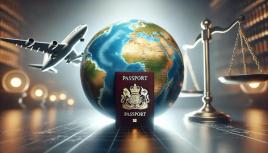

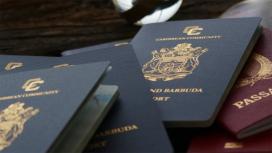

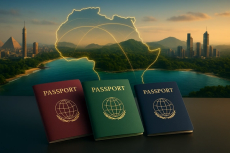



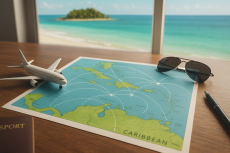
Recently Published

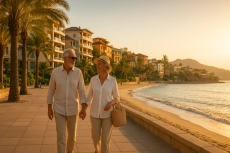
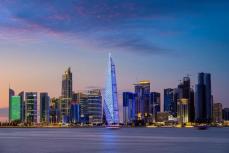






Book a free consultation


